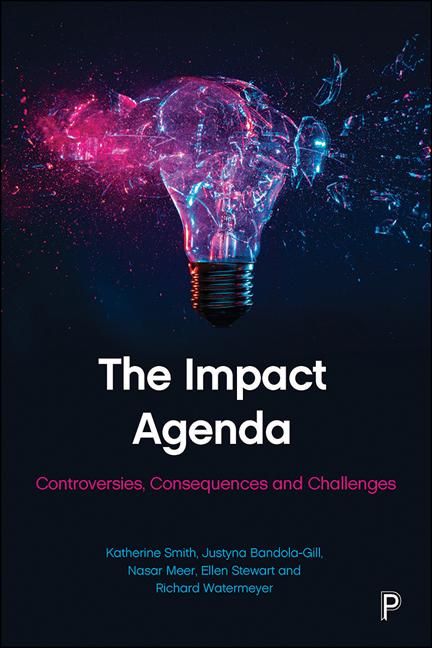Book contents
- Frontmatter
- Contents
- List of figures, tables and boxes
- List of abbreviations
- Notes on authors
- Acknowledgements
- 1 Introduction: Critical Reflections on Research Impact
- 2 The Rise of Research Impact
- 3 Debating the UK Impact Agenda
- 4 Do Experiences and Perceptions of Research Impact Vary by Discipline?
- 5 Impact on whom? Contrasting Research Impact with Public Engagement
- 6 Public Intellectualism and the Impact Agenda: International Perspectives
- 7 Academic Life in the Impact Vanguard: The View from Knowledge Exchange Organisations
- 8 Looking Back: Evolving Public Health Perspectives on Research Impact
- 9 Telling Tales of Impact: As Seen Through the Eyes of User Assessors
- 10 Conclusion: What Would an Evidence-Informed Impact Agenda Involve?
- References
- Index
3 - Debating the UK Impact Agenda
Published online by Cambridge University Press: 23 February 2021
- Frontmatter
- Contents
- List of figures, tables and boxes
- List of abbreviations
- Notes on authors
- Acknowledgements
- 1 Introduction: Critical Reflections on Research Impact
- 2 The Rise of Research Impact
- 3 Debating the UK Impact Agenda
- 4 Do Experiences and Perceptions of Research Impact Vary by Discipline?
- 5 Impact on whom? Contrasting Research Impact with Public Engagement
- 6 Public Intellectualism and the Impact Agenda: International Perspectives
- 7 Academic Life in the Impact Vanguard: The View from Knowledge Exchange Organisations
- 8 Looking Back: Evolving Public Health Perspectives on Research Impact
- 9 Telling Tales of Impact: As Seen Through the Eyes of User Assessors
- 10 Conclusion: What Would an Evidence-Informed Impact Agenda Involve?
- References
- Index
Summary
Introduction: key concerns with, and critiques of, the UK’s impact agenda
As Chapter 2 began to outline, the announcement of REF's inclusion of impact assessment ignited intense debate among academics. Statements outlining how research impact would be retrospectively assessed via REF appear to have generated particularly widespread concerns. In contrast, responses to the adoption of pathways to impact statements by UK Research Councils and the UKRI have, since Braben et al's (2009) Times Higher letter, been comparatively muted. Sociologist John Holmwood has questioned this, since it is in shaping new research that such changes have the potential to have their greatest repercussions for academic activity (though of course, advance knowledge about what REF is trying to measure and reward may also shape research activity):
Whereas the REF impact agenda is the one that has generated most comment within the academic community, it is the [UK Research Councils’] ‘pathways to impact’ that should generate most immediate concern. The former is an ex post judgement, whereas the latter seeks to transform the research culture. (Holmwood, 2011b: 14)
Although the majority of voices commenting on the UK's approach to research impact are critical of specific aspects, this does not mean that they disagree with the basic, underlying assumption: that science should be, in some way, beneficial to society. Indeed, the idea that academics should be subject to something like a ‘social contract’ (Martin, 2011), in which they receive public funds and, in return, provide society with useful innovations, seems to be broadly supported, with some academics themselves articulating a moral or ethical obligation to work towards achieving (socially beneficial) change. For example, Eynon (2012: 2) reflects that researchers have ‘always wanted to make a difference’, while Smith's research on public health researchers cites multiple examples of academics expressing a desire to achieve impact (see Smith, 2013; see also Chapter 6).
The issues with the UK's research impact agenda that we have identified in existing literature rarely challenge the fundamental premise that academic research and other intellectual work should be socially beneficial. Rather, concerns tend to focus on the potential consequences of current efforts to incentivise, measure and reward research impact in the UK.
- Type
- Chapter
- Information
- The Impact AgendaControversies, Consequences and Challenges, pp. 27 - 62Publisher: Bristol University PressPrint publication year: 2020



